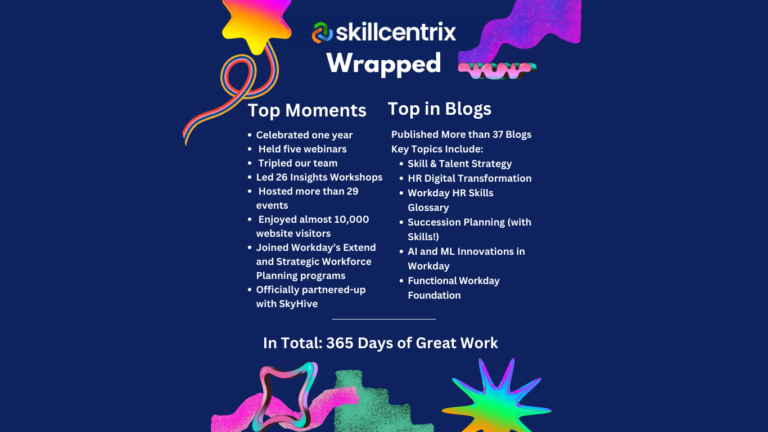Executives Weigh In: What Defines Skills Strategy Success? [Three Keys]
![Executives Weigh In: What Defines Skills Strategy Success? [Three Keys]](https://skillcentrix.com/hs-fs/hubfs/Imported_Blog_Media/pexels-fauxels-3184405-768x512-2.jpg?width=950&name=pexels-fauxels-3184405-768x512-2.jpg)
It’s late 2023, which means that most likely you (and definitely your corporate leadership) are starting to get clued into the value of driving toward a skill-centric organization.
In fact, Aptitude Research’s Mid-Year Trends Report found many firms are moving to “skills-based everything” — with 95% of companies stating that skills are more important than job titles when promoting employees.
And yet, according to the World Economic Forum, while some progress has been made towards a skills-focused future, only about 44% of firms are leading with a “disruptive” skills approach.
Why are we still seeing some lag in skills adoption? While valuable, skills rollouts are not innately simple – unless you have the right foundation.
Across the ecosystem, we see the plurality of clients understand the value of a skills strategy but struggle with where to start.
We set out to solve that by looking to coalesce lessons from the most successful, productive, and adopted skills transformations to share with leaders about to embark on that journey.
To do that, we tapped into an HR transformation executive pool for a recent webinar. In that executive session, we pulled together a panel of experts including Skillcentrix Co-CEO, Matt Gregory, Rockstar Employee Founder, Laura Hume, as well as SkyHive Head of Partnerships (and former Top 100 Most Powerful Woman in Canada), Petra Kuret, who dove into the ingredients you need to ensure a smooth and successful skills journey.
In this blog post, we’ll explore the top challenges of driving a skills transformation, diving into common pitfalls that can hold teams back from successful implementation. Let’s jump in.
Common Language: Apples to Zebras
“Each best-of-breed technology in the talent skill stack introduces complexity and the potential to inhibit gathering actionable skills data. However, many of the point solutions in the HR tech stack use different 1) definitions, 2) proficiency levels, and 3) levels of granularity, which makes getting actionable data very difficult.” – Rockstar Employees Founder, Laura Hume
One of the main struggles for skills strategy implementations in the “wild” is the lack of standardization across talent tech stack platforms.
These platforms often use different definitions for skills, making it difficult to compare and assess employees’ capabilities consistently.
Additionally, the definition of proficiency levels can vary significantly between platforms, leading to confusion when evaluating skill levels and development needs. Moreover, the levels of granularity employed by these platforms can differ, creating confusion for leaders trying to align skills data and prioritize strategic talent initiatives effectively.
Overcoming these discrepancies and establishing a standardized framework for skills assessment is crucial for a successful skills strategy implementation.
KISS: Keep It Simple Skills
“Skills are like a hammer to an organization, where every problem looks like a nail.” – HR Transformation leader, Jeff Johnson
HR projects frequently attempt to tackle too much at once. We’ve all seen this – and likely get the danger – but it can be hard in the middle of a transformation not to try and solve for every stakeholder.
But transformers beware: Those organizations that try to address every HR concern simultaneously, rather than focusing on specific problems, tend to find themselves on a longer and more complicated journey than those who learn to focus.
Attempting too much at once can overwhelm resources, dilute efforts, or create unnecessary bottlenecks that prevent you from driving, you know, actually meaningful results.
To avoid this pitfall, it’s crucial to build a strong foundation by prioritizing and addressing specific HR challenges that align with organizational goals. By concentrating efforts on a well-defined issue, HR projects can allocate resources effectively and make a more significant impact.
Adopting a “test, learn, and iterate” mindset can help HR teams refine their initiatives over time. This approach allows for continuous improvement and ensures that projects remain aligned with evolving organizational needs.
Further, you need to look closely at the skillset of the people responsible for your skills rollout and upskill or reskill your HR BU partners and administrators, if needed.
Providing HR professionals with the necessary knowledge and tools to manage complex projects and navigate the intricacies of talent management can significantly enhance the success of HR initiatives.
The Skills Recipe: What’s Your Skills Data Blend?
“Too many companies rely on internal skills data and dusty competency models or job profiles that are no longer relevant in today’s labor market.” – SkyHive Head of Partnerships, Petra Kuret
When it comes to HR projects, you need some level of external validation to ensure the workforce remains competitive and adaptable.
Too often, organizations rely solely on internal skills data and outdated competency models or job profiles that have become obsolete in the face of evolving industry demands.
However, to thrive in the dynamic landscape of today’s labor market, businesses must actively engage with external sources to gauge broader trends and demands. So, stay attuned to industry benchmarks, emerging skill sets, and job market dynamics, and leverage external data feeds for large labor pools (and where budget allows).
By doing so, companies can align their talent strategies with the ever-changing needs of the workforce, ultimately fostering resilience and sustained success in an increasingly competitive business environment.
Develop Your Skills Strategy in 3, 2, 1…
How do you know if you have the right foundation for your burgeoning skills program?
If you, or anyone on your team, has ever asked the following questions, you might want to download the entire executive chat to brush up:
- Where do I start with my skills strategy journey?
- How can we maximize our value with our tech stack?
- How can we quantify our skills internally?
Still want more insights on how to drive business value across the talent lifecycle and create a consumable skills strategy for 2024 and beyond?
Hear the experts in their own words by checking out the on-demand webinar here.


